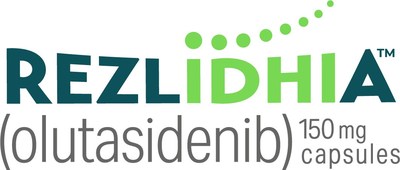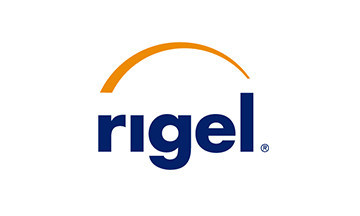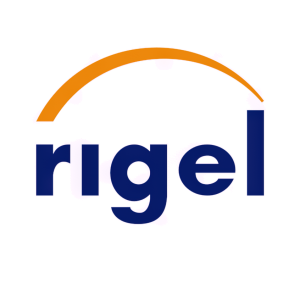Rigel Announces U.S. FDA Approval of REZLIDHIA™ (olutasidenib) for the Treatment of Adult Patients with Relapsed or Refractory Acute Myeloid Leukemia with a Susceptible IDH1 Mutation
Rigel Pharmaceuticals announced the FDA approval of REZLIDHIA (olutasidenib) for adult patients with relapsed or refractory acute myeloid leukemia (R/R AML) carrying an IDH1 mutation. This oral mIDH1 inhibitor yielded a 35% complete remission (CR) rate in a Phase 2 trial, with a median duration of response of 25.9 months. The approval is a significant development for R/R AML patients, improving treatment options. The company plans to commercialize REZLIDHIA in the U.S., enhancing their hematology-oncology portfolio.
- FDA approval of REZLIDHIA may provide a new treatment option for R/R AML patients.
- REZLIDHIA demonstrated a 35% CR+CRh rate, indicating high efficacy.
- Median duration of response was 25.9 months, surpassing current treatments.
- REZLIDHIA carries risks including differentiation syndrome (16% incidence) and hepatotoxicity (23% incidence).
Insights
Analyzing...
REZLIDHIA is a potentially market-leading, oral, mutant isocitrate dehydrogenase-1 (mIDH1) inhibitor
Phase 2 registrational data supporting the approval showed a
Conference call and webcast to be held today at 6:30 p.m. ET
SOUTH SAN FRANCISCO, Calif., Dec. 1, 2022 /PRNewswire/ -- Rigel Pharmaceuticals, Inc. (Nasdaq: RIGL) today announced that the U.S. Food and Drug Administration (FDA) has approved REZLIDHIA™ (olutasidenib) capsules for the treatment of adult patients with relapsed or refractory (R/R) acute myeloid leukemia (AML) with a susceptible isocitrate dehydrogenase-1 (IDH1) mutation as detected by an FDA-approved test. REZLIDHIA is an oral, small molecule, inhibitor of mutated IDH1 designed to bind to and inhibit mIDH1 to reduce 2-hydroxyglutarate levels and restore normal cellular differentiation of myeloid cells.
"REZLIDHIA is a novel, non-intensive monotherapy treatment in the relapsed/refractory AML setting demonstrating a CR+CRh rate of
The FDA approval was supported by data from the open-label Phase 2 registrational study evaluating REZLIDHIA monotherapy at a dose of 150 mg twice daily in 153 mIDH1 R/R AML patients. The efficacy-evaluable population was 147 patients who initiated REZLIDHIA at least six months prior to the interim analysis cutoff date of June 18, 2021, and who had a centrally confirmed IDH1 mutation. The primary endpoint was a composite of a complete remission (CR) plus a complete remission with partial hematological recovery (CRh). CRh is defined as less than
Results from the trial demonstrated a
"We are delighted by the approval of REZLIDHIA based on the strength of data supporting the efficacy and safety of the product," said Raul Rodriguez, Rigel's president and CEO. "REZLIDHIA provides a new and important, oral therapy option for patients who typically have a poor clinical outcome. Additionally, this approval greatly strengthens and expands Rigel's commercial hematology-oncology portfolio. I would like to extend our sincerest thanks to all the patients, their families and caregivers, the doctors, the FDA, and our team members who have all contributed to the approval of REZLIDHIA."
In August 2022, Rigel and Forma Therapeutics, Inc. announced they entered an exclusive, worldwide license agreement to develop, manufacture and commercialize REZLIDHIA. Under the terms of the agreement, Rigel will be responsible for the launch and commercialization of REZLIDHIA in the U.S., and intends to work with potential partners to further develop and commercialize the product outside the U.S.
Conference Call and Webcast Today at 6:30PM Eastern Time
Rigel will hold a live conference call and webcast today at 6:30 p.m. Eastern Time (3:30 p.m. Pacific Time) to discuss the FDA approval of REZLIDHIA.
Participants can access the live conference call by dialing 877-407-3088 (domestic) or 201-389-0927 (international). The conference call will also be webcast live and can be accessed from the Investor Relations section of the company's website at www.rigel.com. The webcast will be archived and available for replay after the call via the Rigel website.
About AML
Acute myeloid leukemia (AML) is a rapidly progressing cancer of the blood and bone marrow that affects myeloid cells, which normally develop into various types of mature blood cells. AML occurs primarily in adults and accounts for about 1 percent of all adult cancers. The American Cancer Society estimates that in the United States alone, there will be about 20,050 new cases, most in adults, in 2022.1
Relapsed AML affects about half of all patients who, following treatment and remission, experience a return of leukemia cells in the bone marrow.2 Refractory AML, which affects between 10 and 40 percent of newly diagnosed patients, occurs when a patient fails to achieve remission even after intensive treatment.3 Quality of life declines for patients with each successive line of treatment for AML, and well-tolerated treatments in relapsed or refractory disease remain an unmet need.
About REZLIDHIA™
INDICATION
REZLIDHIA is indicated for the treatment of adult patients with relapsed or refractory acute myeloid leukemia (AML) with a susceptible isocitrate dehydrogenase-1 (IDH1) mutation as detected by an FDA-approved test.
IMPORTANT SAFETY INFORMATION
WARNING: DIFFERENTIATION SYNDROME Differentiation syndrome, which can be fatal, can occur with REZLIDHIA treatment. |
WARNINGS AND PRECAUTIONS
Differentiation Syndrome
REZLIDHIA can cause differentiation syndrome. In the clinical trial of REZLIDHIA in patients with relapsed or refractory AML, differentiation syndrome occurred in
If differentiation syndrome is suspected, temporarily withhold REZLIDHIA and initiate systemic corticosteroids (e.g., dexamethasone 10 mg IV every 12 hours) for a minimum of 3 days and until resolution of signs and symptoms. If concomitant leukocytosis is observed, initiate treatment with hydroxyurea, as clinically indicated. Taper corticosteroids and hydroxyurea after resolution of symptoms. Differentiation syndrome may recur with premature discontinuation of corticosteroids and/or hydroxyurea treatment. Institute supportive measures and hemodynamic monitoring until improvement; withhold dose of REZLIDHIA and consider dose reduction based on recurrence.
Hepatotoxicity
REZLIDHIA can cause hepatotoxicity, presenting as increased alanine aminotransferase (ALT), increased aspartate aminotransferase (AST), increased blood alkaline phosphatase, and/or elevated bilirubin. Of 153 patients with relapsed or refractory AML who received REZLIDHIA, hepatotoxicity occurred in
Monitor patients frequently for clinical symptoms of hepatic dysfunction such as fatigue, anorexia, right upper abdominal discomfort, dark urine, or jaundice. Obtain baseline liver function tests prior to initiation of REZLIDHIA, at least once weekly for the first two months, once every other week for the third month, once in the fourth month, and once every other month for the duration of therapy. If hepatic dysfunction occurs, withhold, reduce, or permanently discontinue REZLIDHIA based on recurrence/severity.
ADVERSE REACTIONS
The most common (≥
DRUG INTERACTIONS
- Avoid concomitant use of REZLIDHIA with strong or moderate CYP3A inducers.
- Avoid concomitant use of REZLIDHIA with sensitive CYP3A substrates unless otherwise instructed in the substrates prescribing information. If concomitant use is unavoidable, monitor patients for loss of therapeutic effect of these drugs.
LACTATION
Advise women not to breastfeed during treatment with REZLIDHIA and for 2 weeks after the last dose.
GERIATRIC USE
No overall differences in effectiveness were observed between patients 65 years and older and younger patients. Compared to patients younger than 65 years of age, an increase in incidence of hepatotoxicity and hypertension was observed in patients ≥65 years of age.
HEPATIC IMPAIRMENT
In patients with mild or moderate hepatic impairment, closely monitor for increased probability of differentiation syndrome.
Click here for Full Prescribing Information, including Boxed WARNING.
To report side effects of prescription drugs to the FDA, visit www.fda.gov/medwatch or call 1-800-FDA-1088 (800-332-1088).
REZLIDHIA is a registered trademark of Rigel Pharmaceuticals, Inc.
About Rigel
Rigel Pharmaceuticals, Inc. (Nasdaq: RIGL) is a biotechnology company dedicated to discovering, developing and providing novel small molecule drugs that significantly improve the lives of patients with hematologic disorders, cancer, and rare immune diseases. Founded in 1996, Rigel is based in South San Francisco, California. For more information on Rigel, the Company's marketed products and pipeline of potential products, visit www.rigel.com.
- The American Cancer Society. Key Statistics for Acute Myeloid Leukemia (AML). Revised January 12, 2022. Accessed Aug. 1, 2022 at https://www.cancer.org/cancer/acute-myeloid-leukemia/about/key-statistics.html
- Leukaemia Care. (2019). Relapse in Acute Myeloid Leukaemia (AML). Version 3. Reviewed October 2021. Accessed Dec 2, 2021 at https://media.leukaemiacare.org.uk/wp-content/uploads/Relapse-in-Acute-Myeloid-Leukaemia-AML-Web-Version.pdf
- Thol F, Schlenk RF, Heuser M, Ganser A. How I treat refractory and early relapsed acute myeloid leukemia. Blood. 2015 Jul 16;126(3):319-27. doi: https://doi.org/10.1182/blood-2014-10-551911
- REZLIDHIA™️ [package insert] South San Francisco, CA: Rigel Pharmaceuticals, Inc.
Forward Looking Statements
This press release contains forward-looking statements relating to, among other things, that olutasidenib may provide a meaningful benefit to people with R/R AML, Rigel's plan to commercialize olutasidenib in the U.S., and expectations related to the potential and market opportunity of olutasidenib as therapeutics for R/R AML and other conditions. Any statements contained in this press release that are not statements of historical fact may be deemed to be forward-looking statements. Forward-looking statements can be identified by words such as "plan", "potential", "may", "expects", "will" and similar expressions in reference to future periods. Forward-looking statements are neither historical facts nor assurances of future performance. Instead, they are based on Rigel's current beliefs, expectations, and assumptions regarding the future of our business, future plans and strategies, projections, anticipated events and trends, the economy and other future conditions, and hence they inherently involve significant risks, uncertainties and changes in circumstances that are difficult to predict and many of which are outside of our control. Therefore, you should not rely on any of these forward-looking statements. Actual results and the timing of events could differ materially from those anticipated in such forward looking statements as a result of these risks and uncertainties, which include, without limitation, risks that the FDA, European Medicines Agency or other regulatory authorities may make adverse decisions regarding olutasidenib; risks that clinical trials may not be predictive of real-world results or of results in subsequent clinical trials; risks that olutasidenib may have unintended side effects, adverse reactions or incidents of misuses; the availability of resources to develop Rigel's product candidates; market competition; as well as other risks detailed from time to time in Rigel's reports filed with the Securities and Exchange Commission, including its Quarterly Report on Form 10-Q for the quarter ended September 30, 2022 and subsequent filings. Any forward-looking statement made by us in this press release is based only on information currently available to us and speaks only as of the date on which it is made. Rigel does not undertake any obligation to update forward-looking statements, whether written or oral, that may be made from time to time, whether as a result of new information, future developments or otherwise, and expressly disclaims any obligation or undertaking to release publicly any updates or revisions to any forward-looking statements contained herein, except as required by law.
Rigel Contacts
Media:
David Rosen, Argot Partners
Phone: 212.600.1902
Email: david.rosen@argotpartners.com
Investors:
Rigel Pharmaceuticals, Inc.
Phone: 650.624.1232
Email: ir@rigel.com
![]() View original content to download multimedia:https://www.prnewswire.com/news-releases/rigel-announces-us-fda-approval-of-rezlidhia-olutasidenib-for-the-treatment-of-adult-patients-with-relapsed-or-refractory-acute-myeloid-leukemia-with-a-susceptible-idh1-mutation-301692086.html
View original content to download multimedia:https://www.prnewswire.com/news-releases/rigel-announces-us-fda-approval-of-rezlidhia-olutasidenib-for-the-treatment-of-adult-patients-with-relapsed-or-refractory-acute-myeloid-leukemia-with-a-susceptible-idh1-mutation-301692086.html
SOURCE Rigel Pharmaceuticals, Inc.









